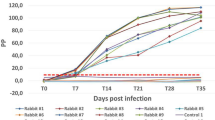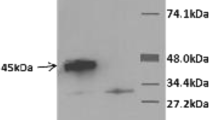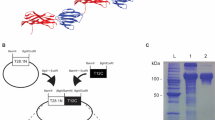Abstract
As a rule, Vibrio cholerae does not enter the intestinal tissues and the blood stream. Cholera is a disease due to the toxins of the causative vibrio which are liberated in the lumen of the gut. The toxins have not yet been completely defined but the most important of them seem to be those of group 2 of Burrows1. These produce a cholera-like syndrome when injected into the upper part of the small intestine of infant rabbits or into the ligated intestinal loop of adult rabbits1,2. The serological responses of vervet monkeys (Cercopithecus aethiops) to crude cholera toxin prepared according to Oza and Dutta3 and Burrows et al.2, phenolized cholera vaccine, and V. cholerae lipopolysaccharide have been investigated by our group4,5. It was found that the serum immune globulin G is the most important carrier of the V. cholerae toxicity neutralizing factor(s) in the circulating blood. The purpose of these experiments was to establish the antibody producing capability of mesenteric lymph gland and spleen cells, as well as to investigate the relationship of serum Ig-bound antibodies to the toxin neutralizing capability of Ig in the secretions and excretions of the intestinal tract.
This is a preview of subscription content, access via your institution
Access options
Subscribe to this journal
Receive 51 print issues and online access
$199.00 per year
only $3.90 per issue
Buy this article
- Purchase on Springer Link
- Instant access to full article PDF
Prices may be subject to local taxes which are calculated during checkout
Similar content being viewed by others
References
Burrows, W., Proc. Cholera Res. Symp., Honolulu, Hawaii, 131 (1965).
Burrows, W., Musteikis, G. M., Oza, N. G., and Dutta, N. K., J. Infect. Dis., 115, 1 (1965)
Oza, N. B., and Dutta, N. K., J. Bact., 85, 497 (1963).
Felsenfeld, O., Felsenfeld, A. D., Greer, W. E., and Hill, C. W., J. Infect. Dis., 116, 329 (1966).
Felsenfeld, O., Greer, W. E., and Hill, C. W., Proc. Roy. Soc. Trop. Med. and Hyg., 60, 514 (1966).
Watanabe, Y., and Seaman, G. R., Arch. Biochem. Biophys., 97, 393 (1962).
Watanabe, Y., and Verwey, W. F., Bull. World Health Organ., 32, 809 (1965).
Vaerman, J. P., Heremans, J. F., and Vaerman, C., J. Immunol., 91, 7 (1963).
Halliday, W. J., and Webb, M., Austral. J. exp. Biol. med. Sci., 43, 163 (1965).
Read, J. K., Proc. Cholera Res. Symp., Honolulu, Hawaii, 151 (1965).
Tomasi, jun, T. B., Tan, E. M., Somonon, R., and Pendergast, A., J. Exp. Med., 121, 101 (1965).
Fisher, J. M., Rees, C., and Taylor, K. B., Science, 150, 1467 (1965).
Herlimann, J., Helvet. Med. Acta, 30, 126 (1963).
Chordirker, W. B., and Tomasi, jun, T. B., Science, 142, 1080 (1963).
Author information
Authors and Affiliations
Rights and permissions
About this article
Cite this article
FELSENFELD, O., GREER, W. & FELSENFELD, A. Cholera Toxin Neutralization and Some Cellular Sites of Immune Globulin Formation in Cercopithecus aethiops. Nature 213, 1249–1251 (1967). https://doi.org/10.1038/2131249a0
Issue Date:
DOI: https://doi.org/10.1038/2131249a0
Comments
By submitting a comment you agree to abide by our Terms and Community Guidelines. If you find something abusive or that does not comply with our terms or guidelines please flag it as inappropriate.



